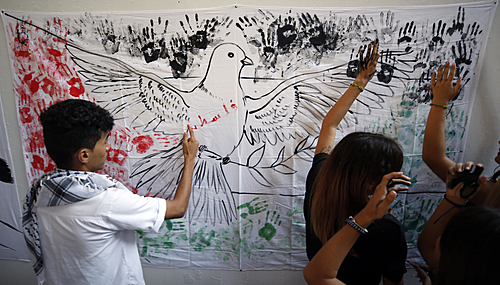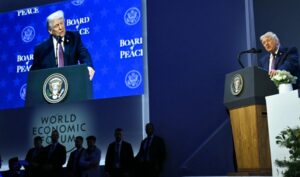
While portals around the world count the deaths caused by the constant bombing of Gaza as if they were mere numbers, hundreds of Palestinians living in Cuba experience every minute the terror that has forever transformed their land. Most of them are young people who are studying on the island.
“The bombings have been recurring throughout my life. I grew up with Gaza being bombed two or even three times a year by the State of Israel. Every year they kill people, every year they injure people,” says Abdelhadi Bassam to Brazil in factwithout hiding the anguish and indignation in his voice.
A second-year student at the Latin American School of Medicine (ELAM) in Cuba, he follows the escalation of military violence in his homeland from a distance. On the eve of Israel’s land invasion, last Friday (27), the precarious internet connection to Gaza was completely cut off.
The anguish that accompanied Abdelhadi and his companions turned into terror when, on Friday the 27th, all communications with Gaza were cut. For 34 hours, any information that could reach Gaza directly was eliminated.
One day after the blackout began, on October 28, Israeli military spokesman Daniel Hagari published a video on X – formerly Twitter – reiterating, once again, that, for their “immediate safety”, northern residents of Gaza and Gaza City should “temporarily move south”. In this message, Hagari again announced that Israel would intensify its attacks. This ended up happening throughout the weekend, coinciding with a total communications blackout.
Concern among Palestinian students on the island was growing as they tried to piece together what little information was circulating. “Nobody ever talks about it. Most of the time, we don’t even know why, or what happened. We just get bombed for a few hours or days at a time. Bombs that fall on people who are going to the supermarket, to school, or who are just at home”, he says about his experience with the bombings in Gaza.
Unprecedented destruction
Bombings have intensified in recent days and this Tuesday (31) hit the largest refugee camp in Gaza, the Jabali camp, causing the death of at least 50 people and leaving another 150 injured. The escalation of the Israeli offensive against the Palestinian population has generated a series of diplomatic responses around the world and this Wednesday (1), the government of Jordan, a key ally of Israel, summoned its ambassador to the country.
According to the spokesman for the Gaza Ministry of Health, Ashraf al-Qidra, the incessant Israeli attacks have caused more than 9,000 deaths, of which more than 3,500 are children. Furthermore, it is estimated that more than 1,650 people are missing, including 940 children, who are suspected to be buried under the rubble of destroyed buildings.
More than 1.4 million Gazans have been displaced. Forced to flee their homes, seeking refuge in mosques, churches, schools and hospitals. The World Health Organization (WHO) recorded 34 attacks on health facilities in Gaza, including 21 hospitals. While 12 of Gaza’s 35 hospitals can no longer function as a result of the blockade of supplies and bombing.
The first bombing in 2008
“The first experience I remember was in 2008,” Bassam says. “Israel started bombing the entire Gaza Strip. I was walking home from school and on the way, a bomb fell on a police office. I was only seven or eight years old. I was very scared, I was alone and so Suddenly I didn’t know where to go. I remember running as fast as I could towards the house.”
The images from that day marked his life forever. Bassam remembers that it was the first time he heard about the occupation. When his father found him, he hugged him, trying to calm the tears that welled up in his fearful son’s eyes. A hug that also tried to calm his own anguish.
His father told him about the occupation of those Palestinian olive lands, from which they have been trying to expel their people for decades. The images of that fateful day, the sound of bombings, the alarms, the screams of people seeking refuge, were no exception. For Palestinians, violence is a recognizable part of everyday life.
“We are living in very difficult times. We are always nervous and distressed. I have barely slept for weeks. I wake up very early and go to bed very late, watching the news,” says Abdelhadi Bassam, his voice shaking.
Since the start of the bombings in Gaza, the Latin American School of Medicine, where Abdelhadi studies, has postponed exam dates three times. The objective was to accompany the approximately one hundred Palestinian students on scholarships at the institution. However, when the date finally arrived, Abdelhadi, like many of his classmates, could do no more than hand over a blank sheet of paper with just his name on it.
“Like many of my classmates, my family is in Gaza. We are always worried that something will happen to them. Our families are under Israeli attack all the time. All day long, we check the death lists, hoping that a familiar name, a family member, a friend or a neighbor doesn’t appear. And yet the vast majority of us know someone who has been martyred,” he says.
Martyr it is the way Palestinians refer to their dead, killed by the Israeli occupation forces. The term is used interchangeably to refer to combatants or civilians. For them, all those killed for the Palestinian cause are martyrs.
To date, at least 29 journalists have been killed in the bombings of Gaza in recent weeks. While those who continue their work in the coastal enclave have to face the constant restriction of telecommunications.
Since I was a child, I wanted to be a doctor,” recalls Abdelhadi. “My father is sick and that was something that motivated me to study medicine. So he could have a doctor in the family and take care of him. It is very difficult to access the healthcare system in Gaza. But I also want to be a doctor so I can help my people. As a Palestinian student, I want to serve my people.”
Bombing of hospitals
“We see the bombing of hospitals, as was the case with the bombing of Al-Alhi Baptist Hospital. This is something that torments us as Palestinians. But at the same time, it gives us enormous strength to want to become doctors and motivates us even more to serve our people in difficult times like this”, he reflects.
The training offered by the Latin American School of Medicine is part of the collaboration agreements between the Cuban people and the Palestinian people and allows them to make a fundamental contribution to the population of the occupied territories: strengthening a medical system that is the target of constant, direct attacks or due to lack of supplies.
Every year, Cuba offers free scholarships so that Palestinians from Gaza, the West Bank or living in refugee camps can study medicine.
These close relations with the Palestinian cause and the Cuban government are not recent, nor do they respond to the most immediate context. On the contrary, they are part of a central strategy of the Cuban revolutionary project in its foreign policy of solidarity.
“We, as Palestinians, carry Cuba in our hearts. Cuba has always been a partner of our country. It has always supported and always demonstrated solidarity with Palestine at all times. And even more so with the difficult times that Palestine is going through”, he highlights Abdelhadi.
“It’s very difficult to be away from my family right now. But I also know that I have a mission, to study so I can be there in the future. To help save the lives of all the children who are being bombed” says Abdelhadi with deep conviction.
Context
The core of the Arab-Israeli issue is the way in which the State of Israel was created in 1948, with numerous unresolved points, such as the expected creation of an Arab State in the Palestine region, the confiscation of land and the expulsion of Palestinians who became refugees in neighboring countries.
The decision to create the two states was taken within the scope of the United Nations (UN) and took place without the agreement of several Arab countries, generating even more conflicts in the region.
:: Israel’s intelligence service underestimated Hamas, says newspaper ::
Over the following decades, the Israeli occupation of the Palestinian territories – supported by the US – became harsher, which stimulated the creation of resistance movements. There were numerous failed attempts at peace agreements and, in the 1990s, the Treaty of Oslo was reached, in which Israel and the Palestine Liberation Organization recognized each other and provided for the end of the Israeli military occupation.
The agreement was met with opposition from sectors in Israel – who even killed the country’s then prime minister – and from Palestinian groups, such as Hamas, which began its campaign with suicide bombers. After the Israeli military exit from the occupied lands in Gaza, the first Palestinian election took place, won by Hamas (2006), but not internationally recognized. The following year, Hamas expelled moderates from the Fatah group from Gaza and dominated the region.
On October 7, 2023, Hamas launched its biggest operation yet, invading Israeli territory and causing the highest number of deaths in the country’s history, 1,400, in addition to taking around 200 hostages. The Israeli response has been brutal, with constant bombings that have already caused the death of thousands of Palestinians, in addition to cutting off water and electricity supplies, measures considered disproportionate, criticized and labeled “massacre” and “genocide” by several international organizations.
Editing: Leandro Melito

Source: www.brasildefato.com.br

